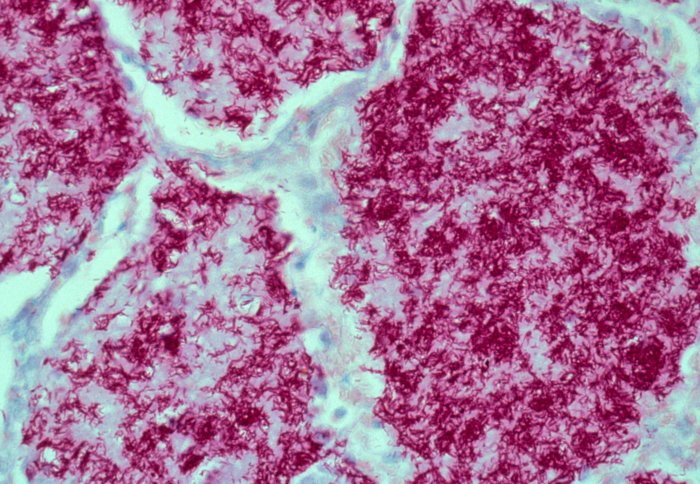CD153: the molecule with potential protective power against TB infection

A microscopic view of the lung from an adult with tuberculosis
A study published this week in Nature Microbiology identifies the molecule CD153 as potentially key to controlling tuberculosis (TB) infection.
In an effort to better understand the mechanisms of immune protection against Mycobacterium tuberculosis (MtB) – the bacterium that causes TB – an international collaboration of researchers investigated the role of the molecule CD153 in two animal TB models, before corroborating their findings in human TB.
As many as two billion people are infected with Mtb, but most will never go on to develop active TB disease because their immune systems are able to control the infection. They may never experience symptoms and do not transmit the bacterium. However, 10% will progress to active TB, and will experience potentially severe and life-threatening illness. In South Africa, more than 100,000 people died due to active TB in 2016.
Of mice, men and molecules
Using a knock-out model – in which researchers inactivate or "knock out" an existing gene by replacing it or disrupting it with an artificial piece of DNA – the team showed that CD153-deficient mice are more susceptible to Mtb infection than wild type animals. They then investigated the role of CD153 in rhesus macaques, a non-human primate model of TB that more closely mimics human disease. They confirmed the protective role of CD153, showing that the more CD153-expressing CD4+ T cells are present in the lung, the fewer bacteria are found.
To translate these findings to human disease, co-authors Catherine Riou and Elsa du Bruyn from the Wellcome Centre for Infectious Diseases Research in Africa (CIDRI-Africa) assessed CD153 expression in individuals with either active or latent Mtb infection. A lower expression of CD153 was observed in Mtb-specific CD4+ T cells in persons with active disease when compared with healthy individuals.
Improving future vaccines
Overall, these data suggest that CD153 may be a key component in the control of Mtb infection. Moreover, this molecule may be a useful biomarker of protection and could possibly be used to evaluate the efficacy of new TB vaccines.
“These findings are really exciting and may help in the quest for correlates of protection against tuberculosis and the development of much-needed diagnostic tools. Further studies are now needed to investigate the mechanism of action of CD153,” commented Dr Riou.
Professor Robert Wilkinson from Imperial’s Department of Medicine added: “The quest for factors that protect people against tuberculosis has been difficult and long though critical for vaccine design and evaluation. Whilst all the mechanisms remain to be elucidated, this work presents a series of observations coherent across species that CD153 plays an important role in tuberculosis, and these findings have attracted considerable interest worldwide.”
Dr Pete Gardner, from the Wellcome Trust’s Infection and Immunobiology team, said: “We only have a partial understanding of how our bodies fight TB, which is a real barrier to developing new and more effective vaccines. This important study identifies a critical role for a certain type of immune cell, which can bring about a protective response to the disease in the lungs. This information is vital to informing the design of future vaccines that could help to tackle TB which infects over ten million people around the world each year.”
This article was adapted from a press release by the Wellcome Centre for Infectious Diseases Research in Africa (CIDRI-Africa).
‘Host resistance to pulmonary Mycobacterium tuberculosis infection requires CD153 expression’ by Michelle A. Sallin et al., is published in Nature Microbiology.
Lead image credit: 'Lung: pulmonary tuberculosis': Wellcome Collection. CC0
Article text (excluding photos or graphics) © Imperial College London.
Photos and graphics subject to third party copyright used with permission or © Imperial College London.
Reporter
Ms Genevieve Timmins
Academic Services